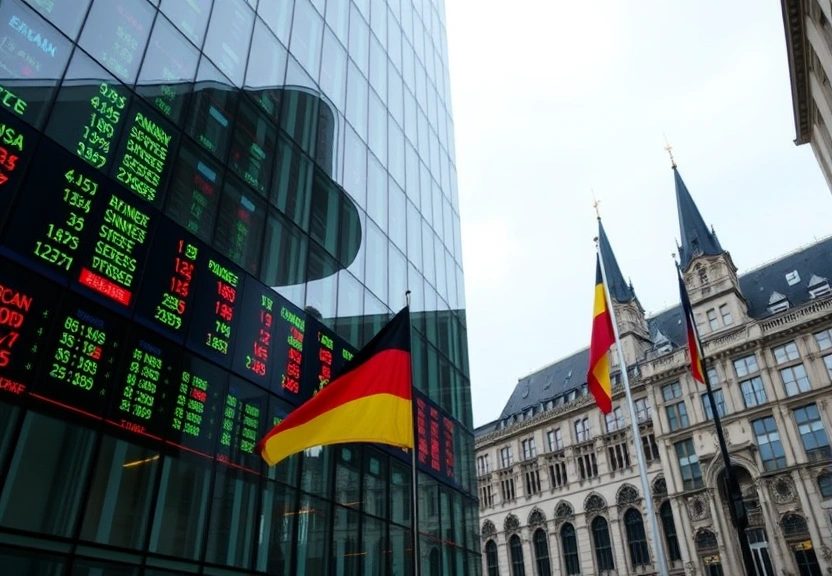Germany’s Stock Market Sees Mixed Results as DAX Dips 0.23% at Close
Germany’s stock market has recently experienced a period of mixed results, culminating in a slight decline for its primary index, the DAX (Deutscher Aktienindex). As of the market close, the DAX fell by 0.23%, reflecting broader uncertainties in the global financial landscape. Investors and analysts alike are closely monitoring the developments in the German market, which has been characterized by fluctuating investor sentiment and various external economic factors.

This article delves into the recent performance of Germany’s stock market, particularly the DAX, and explores the underlying causes for the mixed results. We will analyze market trends, significant stocks influencing the DAX, and provide insights into the current financial climate. By the end of this article, readers will have a clearer understanding of the dynamics at play within Germany’s stock market and what it may mean for future investments.
Understanding the DAX: An Overview
The DAX serves as the benchmark index for the German stock market, comprising 30 of the largest and most liquid companies listed on the Frankfurt Stock Exchange. It is a performance index, meaning it reflects the total return of the underlying equities, including dividends. The DAX is often seen as a barometer of the German economy and offers insights into broader European market trends.
Key Components of the DAX
- Financial Sector: Major banks, such as Deutsche Bank and Commerzbank, significantly influence the DAX due to their size and market capitalization.
- Automotive Industry: Giants like Volkswagen and BMW are critical players, reflecting the health of Germany’s manufacturing sector.
- Technology Sector: Companies like SAP contribute to the index’s performance, showcasing Germany’s growing tech landscape.
Recent Market Performance
The recent dip of 0.23% in the DAX at market close is indicative of a broader trend of mixed results within the German stock market. Various factors contribute to this volatility, including international economic influences, domestic policies, and sector-specific developments. Investors are keenly aware of how these elements can impact stock prices and overall market sentiment.
International Influences
Global economic conditions play a crucial role in shaping the performance of the DAX. Trade tensions, inflation rates, and monetary policy shifts from central banks worldwide can lead to fluctuations in investor confidence. For instance, recent reports of rising inflation in the United States and potential interest rate hikes have prompted investors to reassess their positions in riskier assets.
Domestic Factors
Domestically, the German government’s economic policies, including stimulus measures and regulatory changes, can have a significant impact on market dynamics. Recent initiatives aimed at bolstering the economy post-pandemic, coupled with rising energy costs, have created a mixed bag for investors. The government’s commitment to sustainability and green energy also affects sectors within the DAX differently, leading to shifts in stock performance.
Sector Analysis: Winners and Losers
Within the DAX, certain sectors have outperformed while others have lagged behind, contributing to the overall mixed results. Understanding these sector dynamics is crucial for investors looking to navigate the current market environment.
Top Performers
- Technology: The tech sector has generally shown resilience, with companies like SAP and Infineon Technologies benefiting from increased demand for digital solutions.
- Healthcare: With ongoing investments in pharmaceuticals and biotechnology, this sector has also seen positive momentum, driven by companies such as Bayer and Fresenius.
Underperformers
- Automotive: The automotive sector has faced challenges due to supply chain disruptions and semiconductor shortages, impacting giants like Volkswagen and Daimler.
- Financials: Major banks have struggled with low interest rates and heightened regulations, leading to a lackluster performance in this sector.
Investor Sentiment and Future Outlook
Investor sentiment in Germany’s stock market remains cautious, reflecting the uncertain economic landscape. While some sectors show promise, overall confidence is tempered by external uncertainties and domestic challenges. Analysts suggest that investors should remain vigilant and adaptable as they navigate this volatile market environment.
Strategies for Investors
- Diversification: Investors should consider diversifying their portfolios to mitigate risks associated with sector-specific downturns.
- Research and Analysis: Staying informed about market trends and conducting thorough research can help investors make more informed decisions.
- Long-term Perspective: A long-term investment strategy may be beneficial, particularly in volatile markets, as it allows for potential recovery over time.
FAQs about Germany’s Stock Market and DAX Performance
1. What is the DAX index, and what companies does it include?
The DAX index is a stock market index that comprises 30 of the largest and most liquid companies listed on the Frankfurt Stock Exchange, representing various sectors of the German economy.
2. Why did the DAX dip by 0.23% recently?
The DAX’s recent dip can be attributed to mixed market sentiments influenced by international economic conditions, domestic policy changes, and sector-specific developments.
3. How do global economic factors impact Germany’s stock market?
Global economic factors, such as trade relationships, inflation, and monetary policy changes, can significantly influence investor sentiment and stock prices in Germany’s market.
4. Which sectors are currently performing well in the DAX?
As of the latest market analysis, the technology and healthcare sectors have shown resilience and positive momentum, with companies like SAP and Bayer leading the charge.
5. What investment strategies should be considered in a mixed market environment?
Investors should consider diversification, thorough research, and maintaining a long-term perspective to navigate the challenges of a mixed market environment effectively.
Conclusion
In summary, the recent mixed results of Germany’s stock market, highlighted by a 0.23% dip in the DAX, reflect a complex interplay of various economic factors. While certain sectors show promise, overall investor sentiment remains cautious due to global uncertainties and domestic challenges. As the market evolves, it will be essential for investors to stay informed, adapt their strategies, and seek opportunities amidst the volatility. By understanding the dynamics of the DAX and the broader market, investors can better position themselves for success in Germany’s ever-changing financial landscape.
📰 Original Source
Este artigo foi baseado em informações de: https://www.investing.com/news/stock-market-news/germany-stocks-mixed-at-close-of-trade-dax-down-023-4198184


